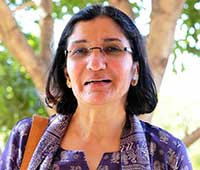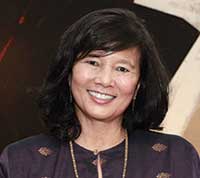Islamic Feminists Speak on Fight to Reclaim Rights
NEW DELHI, India, Dec 22 (IPS) - The court victory to allow women into the inner sanctum of a Sufi shrine in Mumbai was a significant victory for a secular rights-based movement led by Muslim women. However, there is a fear the political climate in India regarding Muslims, could put the women’s rights agenda on the back foot.

Zakia Soman, co-founder of the Bhartiya Muslim Mahila Andolan (BMMA) or the Indian Muslim Women’s movement, in an exclusive interview to IPS, said the historic victory was important for the women-led group to check this (Patriarchal male clergy-led) arrogance.
“Most of our members have an intimate devotion to Sufism. We cannot allow a bunch of conservative men to take it away from us. We are equal humans, equal Muslims, and equal citizens in a democracy,” she says.
“When they refused to listen to us and continued to bar us from entering the shrine, we unanimously decided to take them to court.”
The BMMA in 2016 filed Public Interest Litigation when after years of unfettered access to a Sufi shrine, the Haji Ali Dargah, a sudden restriction was placed on women entering the inner sanctum of the shrine.
The submissions made by the organisation to the High Court questioned this prohibition both based on constitutional guarantees as well as women’s rights in Islam. The verdict was in their favour and in 2016 the High court held that ‘Women must be permitted to enter the sanctum sanctorum on a par with men’.
Soman says the Haji Ali victory was personally a tribute to her maternal grandmother who was a devout Sufi.
Another achievement for the BMMA has been the slow acceptance of Female Qazi’s performing the ‘Nikah’ or marriage for Muslim couples. A domain which has exclusively remained with men, despite there being nothing in the religion that prohibits a woman from solemnising a Nikah.
However, the BMMA has been at the receiving end of criticism for their fight to codify Family laws in India. Many believe the anti-Muslim communal climate in the country calls for other issues to take the lead.
“Today Indian Muslims are facing tremendous onslaught in the form of lynching, discriminatory laws citizenship laws and the looming National Registry of Citizens, so-called love jihad laws etc.,” says Soman.
“There is a direct onslaught that puts a question mark on the citizenship and patriotism of Muslims. I am not sure how many women would come forward to fight for rights in the family when faced with such huge political dangers.”
She recognises the need to keep fighting for gender-just reforms in family laws from within.
BMMA and many other Muslim women’s movements across the globe question the patriarchal interpretations of religious texts which treat women as unequal. As Islamic Feminists, they believe that their religion believes that they are equal to their male counterparts.

Zainah Anwar, Executive Director of Musawah, the global movement for equality in the family and Co-Founder of Sisters in Islam, Malaysia says: “For many of us Muslim women who choose to engage with religion in the realm of women’s rights, it is an article of faith that Islam is just, and God is just”.
“If justice is intrinsic to Islam, then how could injustice and discrimination result from the codification and implementation of laws and policies made in the name of Islam,” she asks in an exclusive interview with IPS, questioning the patriarchal family laws implemented in the name of religion.
Historian and academic Dr Margot Badran defines ‘Islamic feminists’ and says that they draw on the ‘Quranic concept of equality of all human beings’ and thereby insist on applying this concept to everyday life. Defining ‘Islamic feminism’ she says that it “explicates the idea of gender equality as part and parcel of the Qur’anic notion of equality of all insan (human beings) and calls for the implementation of gender equality in the state, civil institutions, and everyday life.”
Throughout the world, Muslim men have been at the realm of interpreting Quranic texts, and these interpretations have been mostly patriarchal. Islamic feminists, however, are changing the contours of these debates.
The movement has a long history and in March 2005, Amina Wadud, an Islamic scholar, and feminist was at the centre of the debate, criticism, and discussion. Dr Wadud accepted the invitation to lead a mixed prayer, and led it, in the Synod House, New York. At the receiving end of death threats and criticism from those who believed that Islam prohibits the act, the former Islamic studies professor at Virginia University said in many media interviews that followed, that, “There is nothing in the Qur’an or the hadith that forbids me from doing this.”
Post the Shah Bano judgment in India and the passage of the Muslim Women’s bill in 1986, and amidst a communally polarised atmosphere, Muslim women who developed a feminist consciousness tried to address gender injustice in the Muslim personal law being followed at the time by invoking and relying on Islamic reinterpretations of sacred texts.
As in Muslim societies at the time, in India as well, in this period, women were perceived as symbols of religious tradition with any dissent on their part being construed as a betrayal to community identity.
This paradox, however, came to a halt in Muslim societies, as the twentieth century drew to a close. Like their counterparts in the Muslim majority states, conservative (mostly Ashraf or higher caste) male clergy in India started laying greater emphasis on patriarchal gender notions which in turn provoked many women to take up activism to counter these claims.
These women saw no inherent connection between patriarchy and Islam. By the end of the 1980’s there was an emergence of a movement which was ‘feminist in its aspirations and demands yet Islamic in its language and sources of legitimacy, one version of this new discourse is Islamic feminism’.1
In recent times, there have been several efforts in various parts of the country for Muslim women to enter the religious realm interpreting the Quran and Shariat from a women’s perspective. They have worked towards reclaiming spaces using constitutional means and the law of the land as well, that have been increasingly taken away from them.
Questioning status quo, however, is not easy and Muslim women across the world challenging patriarchal norms have faced resistance from within and outside their communities. Anwar tells IPS: “We are often accused of being westernised elites, anti-Islam, anti-Shari’ah, women who have deviated from our faith and have weak Iman (faith). Reports are made against us to the police, to the religious authorities to take action against us, to silence us, to charge us for insulting Islam, to ban our groups.”
“We cannot be told that Islam is a way of life ... and then confer on Muslim men the sole authority to decide what Islam is and what it’s not. That’s despotism. As we can see from Muslim women leading movements all over the world for reform and rights - we will not be silenced and intimidated,” says Anwar.
1 Ziba Mir?Hosseini, ‘Muslim Women's Quest for Equality: Between Islamic Law and Feminism’ (The university of Chicago Press 2006) 32 (4) Critical Inquiry 629
Mariya Salim is a fellow at IPS UN Bureau
Follow @IPSNewsUNBureau
Follow IPS New UN Bureau on Instagram
© Inter Press Service (2020) — All Rights Reserved. Original source: Inter Press Service
 Global Issues
Global Issues